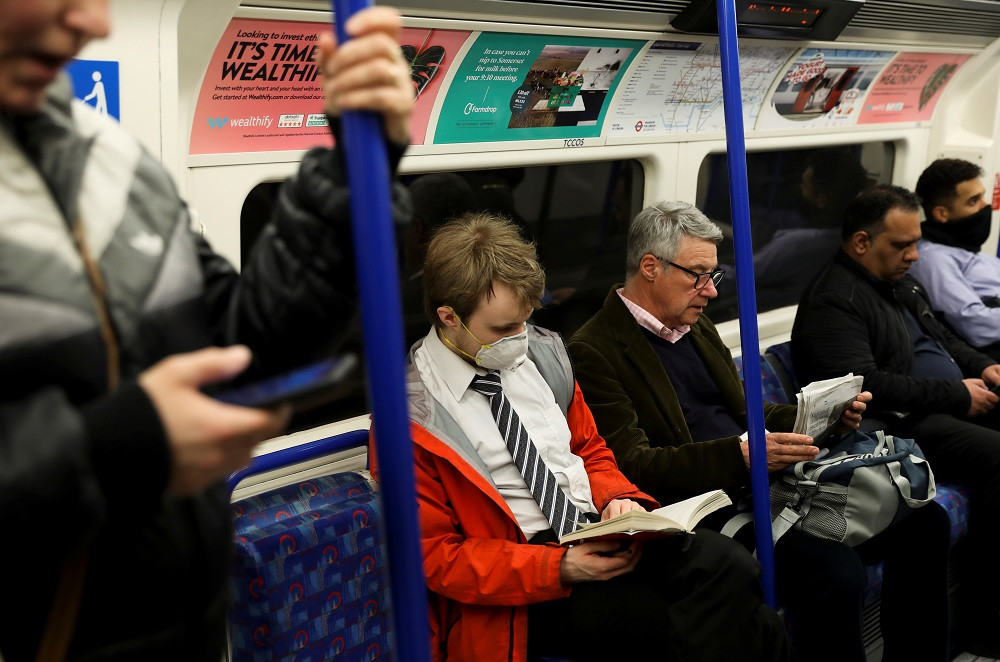Popular Reads
Top Results
Can't find what you're looking for?
View all search resultsPopular Reads
Top Results
Can't find what you're looking for?
View all search resultsWalk, cycle or drive? Coronavirus shakes up urban transport
Anxiety about infection has been evident on London's subway with many commuters wearing face marks - a few fashioned from bags and plastic boxes - while a man was arrested for licking his fingers and wiping them on a subway pole in Belgium.
Change text size
Gift Premium Articles
to Anyone
C
ycling used to be a leisure activity for Raj Anand but in recent weeks he has biked across London every day to avoid crowded public transport as worries over coronavirus grow.
With no cycle lanes on his route into central London, the busy roads can be scary, but less so than catching the virus from the bus or underground train he usually takes, said Anand.
"I have just got to be careful. Obviously, I can control that ... but you can't control anybody else's commute if they come from an infected region," he told the Thomson Reuters Foundation by phone.
"Maybe this is a wake up call for all of us to cycle and walk more, which is cheaper and healthier."
The World Health Organization called the coronavirus outbreak a pandemic for the first time on Wednesday, with more than 126,000 cases globally, and more than 4,600 deaths, according to a Reuters tally on Thursday.
Anxiety about infection has been evident on London's subway with many commuters wearing face marks - a few fashioned from bags and plastic boxes - while a man was arrested for licking his fingers and wiping them on a subway pole in Belgium.
Transport for London (TfL) said its passenger numbers fell by 2 percent in a week, raising hopes among some that urban dwellers were switching to greener forms of travel. Cities account for about three-quarters of planet-warming greenhouse gas emissions
But the benefits of people choosing to cycle, walk or stay home to avoid coronavirus could be cancelled out if others opted to use cars instead, said Carlos Calvo Ambel, a director at Transport and Environment, a Brussels-based campaign group.
City-wide policies to support more sustainable modes of transport were need to make any shift to cleaner types of travel provoked by coronavirus fears stick, he said.
"It is an opportunity to rethink, now that more people are using alternative means of transport, what is needed in the city to ensure it can facilitate that," he said.
Read also: Coronavirus outbreak slashes China carbon emissions: Study
Behavioral changes
While Chinese authorities acted decisively to stop the spread of the virus in the city of Wuhan in January by shutting public transport networks, other governments have taken a softer approach to try and stem the spread of the virus.
London's transport authority, like many others, said it had enhanced cleaning on its public transit network.
"People should go about their daily lives as normal but should wash their hands more regularly and thoroughly," Lilli Matson, TfL's health and safety director said on its website.
Meanwhile New York's Mayor Bill de Blasio urged the city's 9 million residents to work from home or avoid the rush hour in the subway, which carries 1.8 billion passengers a year.
"We need everyone to do their part," he said on Twitter. "Bike or walk to work if you can."
Some have happily followed the mayor's advice, in a country where more than 1,300 cases of coronavirus have been confirmed and 33 people have died, according to a tally by Johns Hopkins University in Baltimore.
Brooklyn resident Tracey Churray was working from home.
"I work in tech and it's really easy for me to work remotely," said the product manager. "It's .... about containing the spread ... and dampening the overall effect and trying to do right by the community."
Other city residents reacted with scorn.
"Happy to bike to work - but oh wait, you only installed @CitiBikeNYC in wealthy areas of the city," Matteo Ceurvels tweeted in response to the mayor, referring to New York's bike sharing system, which was launched in 2013.
Neil Greenberg, a psychiatrist at King's College London, said coronavirus was unlikely to change people's long-term travel habits, based on his study of the 2005 London suicide bombings on three underground trains and a bus.
In the weeks that followed the attacks, which killed 52 people, Londoners said they would cycle, walk, and might even leave the city. But a follow up study six months later revealed more people were using public transport than before.
"People's alterations in travel are often temporary," he said. "Future travel intentions expressed during a crisis often do not translate into long-term behavioral changes."











